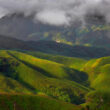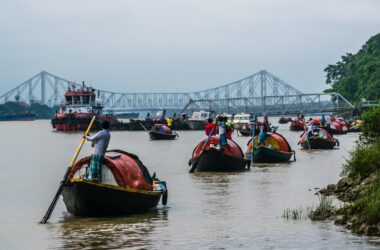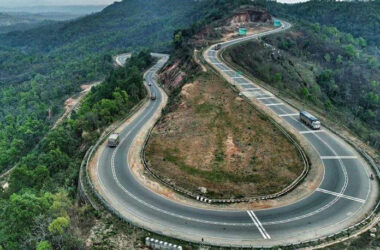Varanasi Weather: Varanasi, a city located in the northern state of Uttar Pradesh, is known for its rich cultural heritage and spiritual significance. With a tropical climate, the city experiences hot and humid summers and cool and dry winters. If you’re planning to visit Varanasi, it’s important to be aware of the weather patterns to help you make the most of your trip.
Summer in Varanasi (March to June) The summer months in Varanasi are characterized by high temperatures and high humidity levels, making it a challenging time to visit the city. The average temperature during this time is around 40°C, with the maximum temperature often reaching 45°C. The hot and humid weather can make it uncomfortable to explore the city and its many attractions, so it’s best to plan your activities for early in the morning or late in the evening when temperatures are more tolerable.
Monsoon in Varanasi (July to September) The monsoon season in Varanasi brings much-needed relief from the hot and humid summer weather. The city receives heavy rainfall during this time, which can cause some disruption to travel and sightseeing plans. The average temperature during the monsoon season is around 30°C, making it a more comfortable time to visit the city. However, visitors should be prepared for some discomfort caused by the rain and be sure to pack suitable clothing and footwear.
Winter in Varanasi (December to February) The winter months in Varanasi are the best time to visit the city, with pleasant weather conditions and comfortable temperatures. The average temperature during this time is around 20°C, making it ideal for exploring the city’s many attractions. The dry and cool weather makes it easy to get around and enjoy outdoor activities, such as visiting the city’s famous temples and exploring its bustling markets.
Overall, the weather in Varanasi can have a significant impact on your visit to the city. Whether you’re planning to visit during the hot and humid summer months or the pleasant winter weather, it’s important to be prepared and pack appropriately. With its rich cultural heritage and spiritual significance, Varanasi is a city that should be on every traveler’s bucket list, and the right weather can make all the difference to your experience.
The city of Varanasi is not only famous for its rich cultural heritage and spiritual significance, but also for its weather patterns, which can be quite varied throughout the year. Understanding the weather in Varanasi can help you plan your trip and make the most of your time in this fascinating city.
The monsoon season in Varanasi can cause some disruptions to travel and sightseeing plans, but it also offers a unique and magical experience. The heavy rainfall transforms the city into a lush, green landscape and the streets become alive with vibrant, colorful umbrellas. During the monsoon season, many of the city’s festivals and religious ceremonies take place, providing a unique insight into local life and culture.
While the summer months in Varanasi can be hot and humid, they also offer an opportunity to experience the city’s famous Ghats. The Ghats are a series of steps leading down to the Ganges River, where locals and visitors alike come to bathe, pray, and perform ritual ceremonies. During the summer months, the Ghats become especially busy and vibrant, providing a unique and unforgettable experience for visitors.
The winter months in Varanasi are considered the best time to visit the city, with comfortable temperatures and pleasant weather conditions. This is the perfect time to explore the city’s many temples, markets, and streets, and to experience its vibrant and bustling atmosphere. The winter weather also makes it easier to get around the city and enjoy outdoor activities, such as visiting the Ghats and taking boat rides on the Ganges River.
In conclusion, the weather in Varanasi can have a significant impact on your visit to the city. Whether you’re planning to visit during the hot and humid summer months, the monsoon season, or the pleasant winter weather, it’s important to be prepared and pack appropriately. With its rich cultural heritage and spiritual significance, Varanasi is a city that should be on every traveler’s bucket list, and the right weather can make all the difference to your experience.
Frequently asked questions about Varanasi weather
Q. What is the average temperature in Varanasi?
A – The average temperature in Varanasi varies throughout the year, with the highest temperatures occurring during the summer months (around 40°C) and the lowest temperatures occurring during the winter months (around 20°C).
Q. Is Varanasi hot all year round?
A – No, Varanasi is not hot all year round. The city experiences hot and humid summers, cool and dry winters, and heavy rainfall during the monsoon season.
Q. When is the best time to visit Varanasi?
A – The best time to visit Varanasi is during the winter months (December to February), when temperatures are pleasant and the weather is dry and cool.
Q. What should I pack for a trip to Varanasi?
A – When packing for a trip to Varanasi, it’s important to consider the weather and pack appropriate clothing and footwear. During the summer months, light, breathable clothing is recommended, while during the monsoon season, rain gear and waterproof footwear is a must. During the winter months, warm clothing and comfortable walking shoes are recommended.
Q. Does Varanasi experience heavy rainfall?
A – Yes, Varanasi experiences heavy rainfall during the monsoon season (July to September). Visitors should be prepared for some discomfort caused by the rain and be sure to pack suitable clothing and footwear.
Q. Can I still visit the Ghats during the monsoon season?
A – Yes, you can still visit the Ghats during the monsoon season, but be prepared for heavy rainfall and be sure to pack suitable clothing and footwear. The monsoon season in Varanasi offers a unique and magical experience, with the Ghats becoming especially vibrant and bustling.
Q. How does the weather affect travel and sightseeing in Varanasi?
A – The weather in Varanasi can have a significant impact on travel and sightseeing. During the hot and humid summer months, it can be challenging to explore the city and its many attractions, so it’s best to plan your activities for early in the morning or late in the evening. During the monsoon season, heavy rainfall can cause some disruption to travel and sightseeing plans, so visitors should be prepared for some discomfort. The winter months offer the best weather conditions for travel and sightseeing, with comfortable temperatures and dry weather.
Q. Is Varanasi prone to natural disasters like floods?
A – Yes, Varanasi is prone to natural disasters like floods, especially during the monsoon season when heavy rainfall can cause the Ganges River to overflow. Visitors should stay informed about the local weather conditions and be prepared for potential disruptions to travel and sightseeing plans.
Q. How does the weather affect religious ceremonies in Varanasi?
A – The weather can have an impact on religious ceremonies in Varanasi, especially during the monsoon season when heavy rainfall can cause some ceremonies to be canceled or postponed. However, many religious ceremonies still take place during the monsoon season and can provide a unique and unforgettable experience for visitors.
Q. Is air conditioning widely available in Varanasi?
A – Yes, air conditioning is widely available in Varanasi, especially in hotels and tourist attractions. Visitors should be prepared for hot and humid weather during the summer months and make use of air conditioning where available.
Q. Can I still enjoy outdoor activities in Varanasi during the monsoon season?
A – Yes, you can still enjoy outdoor activities in Varanasi during the monsoon season, although heavy rainfall may cause some disruptions. Visitors should be prepared for the weather conditions and pack suitable clothing and footwear.
Q. How does the weather impact the local economy in Varanasi?
A – The weather can have a significant impact on the local economy in Varanasi, especially during the monsoon season when heavy rainfall can cause disruptions to travel and tourism. However, many businesses and local economies are able to adapt to the weather conditions, and visitors are still able to experience the city’s vibrant culture and rich history throughout the year.









